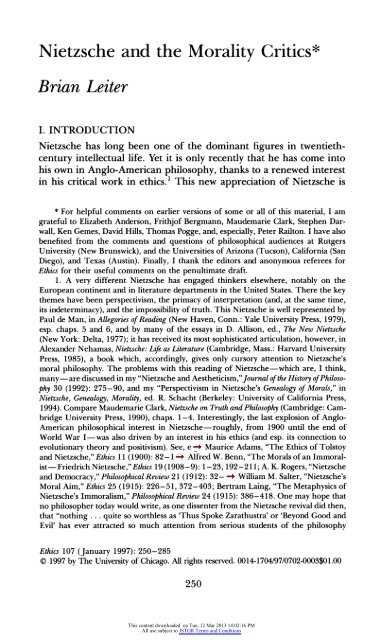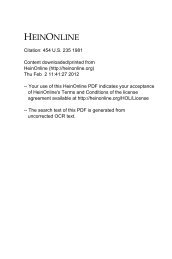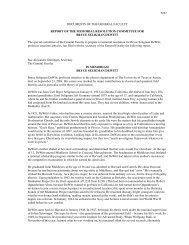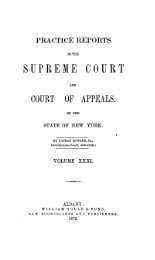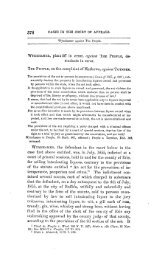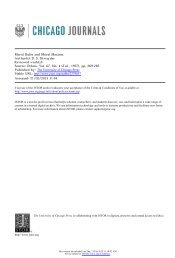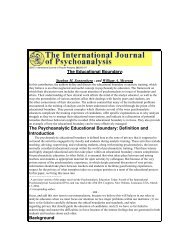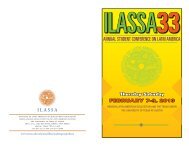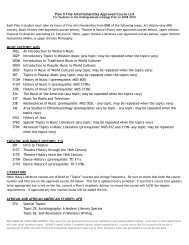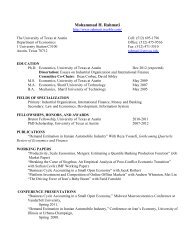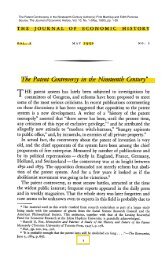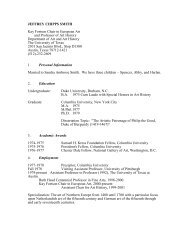Nietzsche and the Morality Critics - The University of Texas at Austin
Nietzsche and the Morality Critics - The University of Texas at Austin
Nietzsche and the Morality Critics - The University of Texas at Austin
You also want an ePaper? Increase the reach of your titles
YUMPU automatically turns print PDFs into web optimized ePapers that Google loves.
<strong>Nietzsche</strong> <strong>and</strong> <strong>the</strong> <strong>Morality</strong> <strong>Critics</strong>*Brian LeiterI. INTRODUCTION<strong>Nietzsche</strong> has long been one <strong>of</strong> <strong>the</strong> dominant figures in twentiethcenturyintellectual life. Yet it is only recently th<strong>at</strong> he has come intohis own in Anglo-American philosophy, thanks to a renewed interestin his critical work in ethics.' This new appreci<strong>at</strong>ion <strong>of</strong> <strong>Nietzsche</strong> is* For helpful comments on earlier versions <strong>of</strong> some or all <strong>of</strong> this m<strong>at</strong>erial, I amgr<strong>at</strong>eful to Elizabeth Anderson, Frithj<strong>of</strong> Bergmann, Maudemarie Clark, Stephen Darwall,Ken Gemes, David Hills, Thomas Pogge, <strong>and</strong>, especially, Peter Railton. I have alsobenefited from <strong>the</strong> comments <strong>and</strong> questions <strong>of</strong> philosophical audiences <strong>at</strong> Rutgers<strong>University</strong> (New Brunswick), <strong>and</strong> <strong>the</strong> Universities <strong>of</strong> Arizona (Tucson), California (SanDiego), <strong>and</strong> <strong>Texas</strong> (<strong>Austin</strong>). Finally, I thank <strong>the</strong> editors <strong>and</strong> anonymous referees forEthics for <strong>the</strong>ir useful comments on <strong>the</strong> penultim<strong>at</strong>e draft.1. A very different <strong>Nietzsche</strong> has engaged thinkers elsewhere, notably on <strong>the</strong>European continent <strong>and</strong> in liter<strong>at</strong>ure departments in <strong>the</strong> United St<strong>at</strong>es. <strong>The</strong>re <strong>the</strong> key<strong>the</strong>mes have been perspectivism, <strong>the</strong> primacy <strong>of</strong> interpret<strong>at</strong>ion (<strong>and</strong>, <strong>at</strong> <strong>the</strong> same time,its indeterminacy), <strong>and</strong> <strong>the</strong> impossibility <strong>of</strong> truth. This <strong>Nietzsche</strong> is well represented byPaul de Man, in Allegories <strong>of</strong> Reading (New Haven, Conn.: Yale <strong>University</strong> Press, 1979),esp. chaps. 5 <strong>and</strong> 6, <strong>and</strong> by many <strong>of</strong> <strong>the</strong> essays in D. Allison, ed., <strong>The</strong> New <strong>Nietzsche</strong>(New York: Delta, 1977); it has received its most sophistic<strong>at</strong>ed articul<strong>at</strong>ion, however, inAlex<strong>and</strong>er Nehamas, <strong>Nietzsche</strong>: Life as Liter<strong>at</strong>ure (Cambridge, Mass.: Harvard <strong>University</strong>Press, 1985), a book which, accordingly, gives only cursory <strong>at</strong>tention to <strong>Nietzsche</strong>'smoral philosophy. <strong>The</strong> problems with this reading <strong>of</strong> <strong>Nietzsche</strong>-which are, I think,many-are discussed in my "<strong>Nietzsche</strong> <strong>and</strong> Aes<strong>the</strong>ticism,"Journal <strong>of</strong> <strong>the</strong> History <strong>of</strong> Philosophy30 (1992): 275-90, <strong>and</strong> my "Perspectivism in <strong>Nietzsche</strong>'s Genealogy <strong>of</strong> Morals," in<strong>Nietzsche</strong>, Genealogy, <strong>Morality</strong>, ed. R. Schacht (Berkeley: <strong>University</strong> <strong>of</strong> California Press,1994). Compare Maudemarie Clark, <strong>Nietzsche</strong> on Truth <strong>and</strong> Philosophy (Cambridge: Cambridge<strong>University</strong> Press, 1990), chaps. 1-4. Interestingly, <strong>the</strong> last explosion <strong>of</strong> Anglo-American philosophical interest in <strong>Nietzsche</strong>-roughly, from 1900 until <strong>the</strong> end <strong>of</strong>World War I-was also driven by an interest in his ethics (<strong>and</strong> esp. its connection toevolutionary <strong>the</strong>ory <strong>and</strong> positivism). See, e.g., Maurice Adams, "<strong>The</strong> Ethics <strong>of</strong> Tolstoy<strong>and</strong> <strong>Nietzsche</strong>," Ethics 11 (1900): 82 - 105; Alfred W. Benn, "<strong>The</strong> Morals <strong>of</strong> an Immoralist-Friedrich <strong>Nietzsche</strong>," Ethics 19 (1908-9): 1 -23, 192-211; A. K. Rogers, "<strong>Nietzsche</strong><strong>and</strong> Democracy," Philosophical Review 21 (1912): 32-50; William M. Salter, "<strong>Nietzsche</strong>'sMoral Aim," Ethics 25 (1915): 226-51, 372-403; Bertram Laing, "<strong>The</strong> Metaphysics <strong>of</strong><strong>Nietzsche</strong>'s Immoralism," Philosophical Review 24 (1915): 386-418. One may hope th<strong>at</strong>no philosopher today would write, as one dissenter from <strong>the</strong> <strong>Nietzsche</strong> revival did <strong>the</strong>n,th<strong>at</strong> "nothing ... quite so worthless as 'Thus Spoke Zar<strong>at</strong>hustra' or 'Beyond Good <strong>and</strong>Evil' has ever <strong>at</strong>tracted so much <strong>at</strong>tention from serious students <strong>of</strong> <strong>the</strong> philosophyEthics 107 (January 1997): 250-285? 1997 by <strong>The</strong> <strong>University</strong> <strong>of</strong> Chicago. All rights reserved. 0014-1704197/0702-0003$01.00250This content downloaded on Tue, 12 Mar 2013 14:02:16 PMAll use subject to JSTOR Terms <strong>and</strong> Conditions


